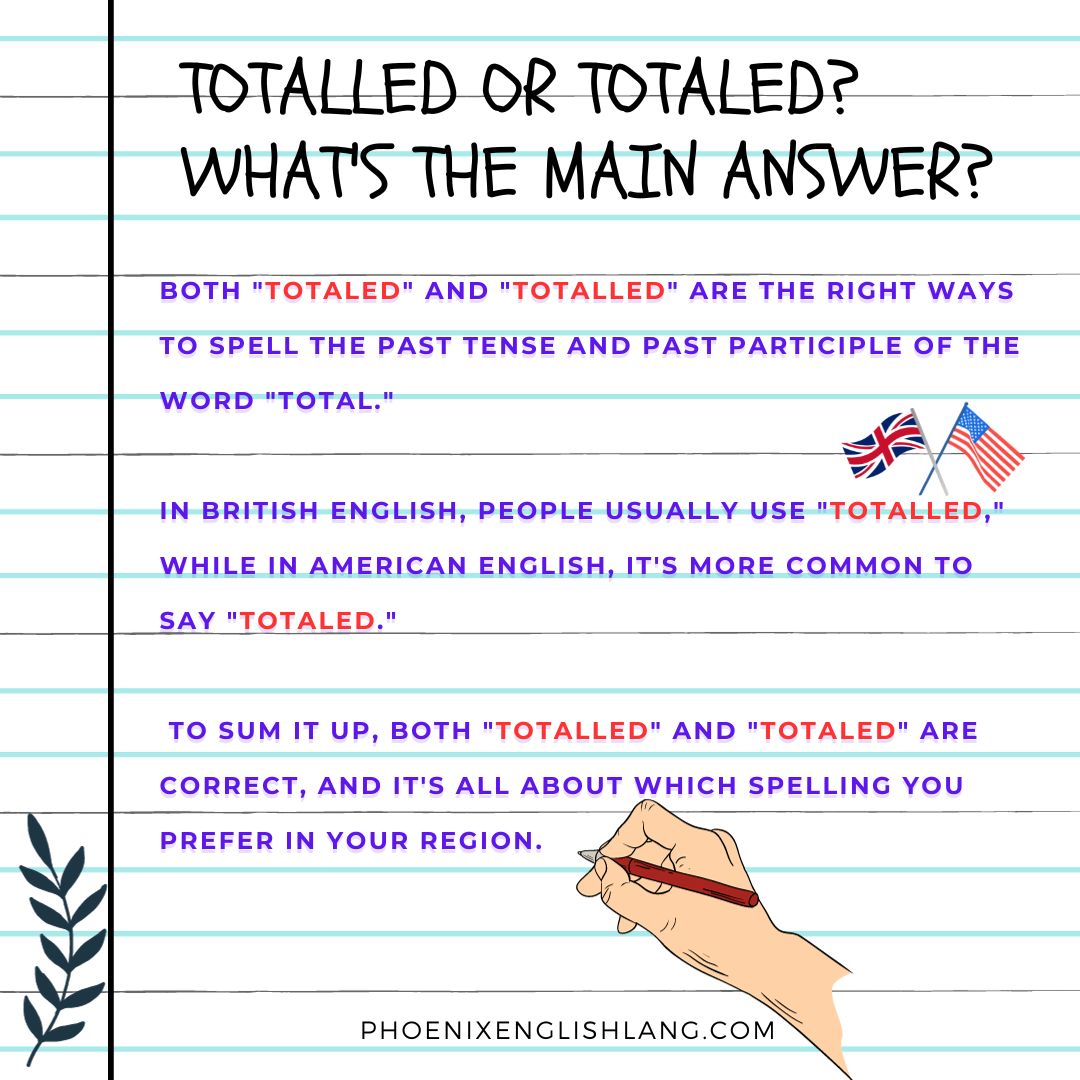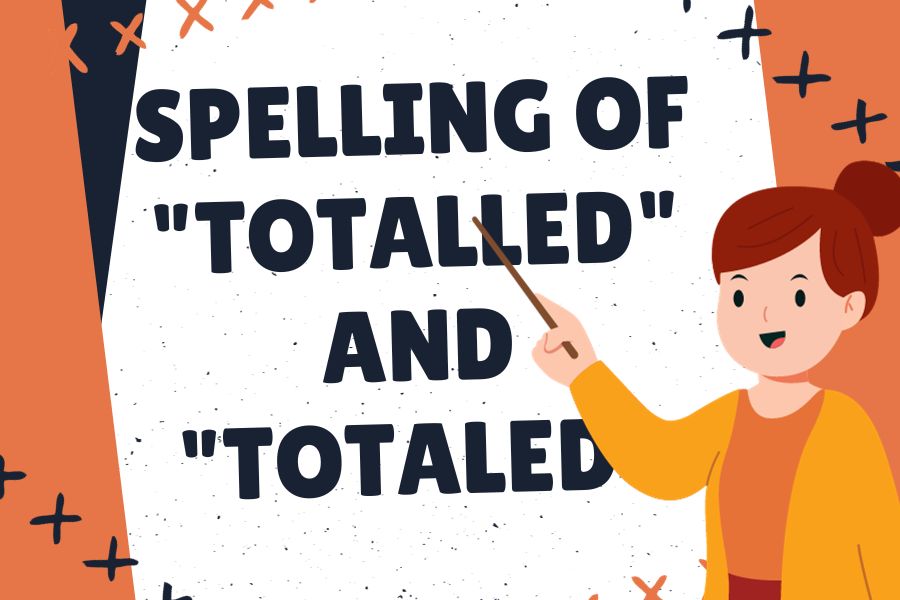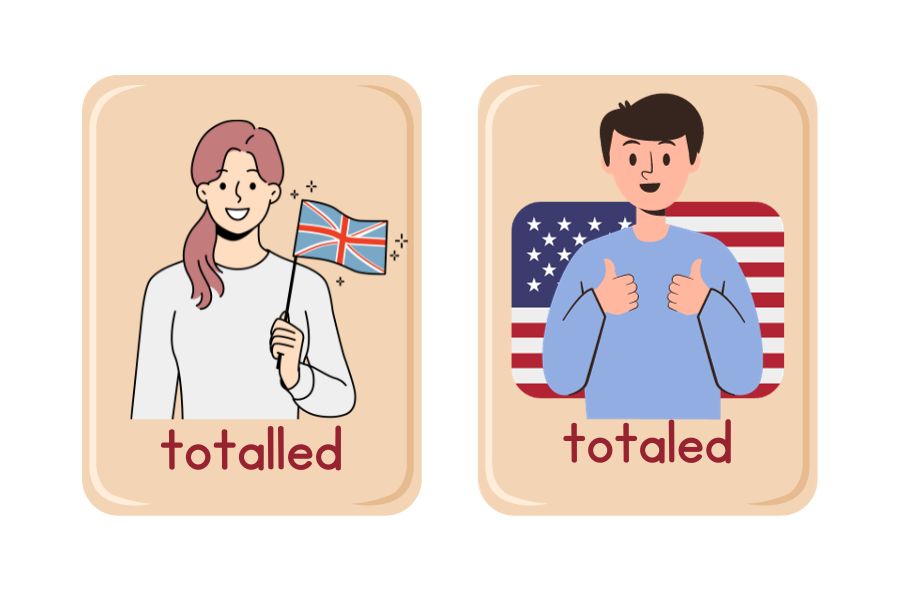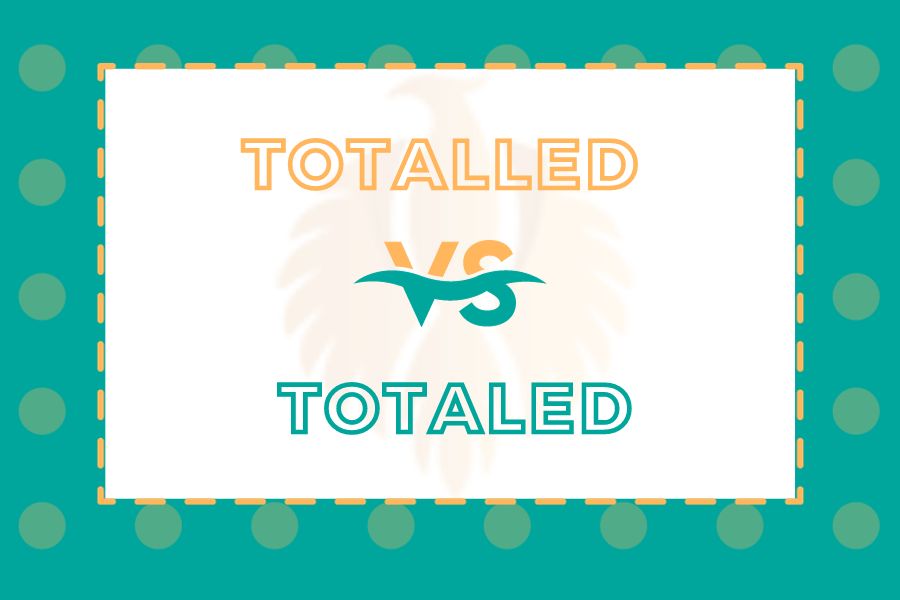![a infographic about Totalled Vs Totaled: 10 Main Differences + Examples [2025]](https://phoenixenglishlang.com/wp-content/uploads/2023/10/unnamed-4.png)
The differences between “totalled” and “totaled” can be understood through the following five key points:
- Spelling Variations: “Totalled” is the preferred spelling in British English, while “totaled” is the American English version. This reflects broader conventions in the English language based on regional usage.
- Context of Use: Both terms mean the same thing—referring to something that has been totaled, often in the context of vehicles deemed beyond repair following an accident. However, the choice of spelling may depend on the audience’s location or preferred style guide.
- Cultural Associations: The use of “totalled” can evoke a more traditional or formal tone often associated with British English, while “totaled” is perceived as more modern and straightforward, commonly used in American contexts.
- Perception in Writing: Writers and editors may choose one spelling over the other to align with their target audience or publication standards. It’s essential to remain consistent with either British or American conventions throughout a piece of writing.
- Examples in Sentences: Usage in sentences can vary based on spelling. For instance, in American English, one might say, “My car was totaled in the accident,” while in British English, it would be, “My car was totalled in the accident.”
Now, let’s dive deeper into this topic, exploring the various nuances that distinguish “totalled” and “totaled” and how understanding these differences can enhance your communication skills.
When wandering through the intricacies of the English language, one can’t help but stumble upon fascinating cases of words that differ primarily in spelling but carry similar meanings. A prime example is the pair “totalled” and “totaled.”
In an age where global communication is increasingly prevalent, understanding these subtleties has become essential—especially in 2025, as language continues to evolve in response to technological advancements and cultural shifts.
At its core, the term “totaled” or “totalled” signifies something that has been rendered completely inoperative or irreparable, often in the context of vehicles following an accident.
While both forms convey the same idea, their usage is closely tied to regional spelling conventions that split upon the Atlantic.
In American English, “totaled” reigns supreme, reflecting a straightforward and direct approach that is characteristic of many words in the U.S. In contrast, “totalled” carries a slightly more formal connotation associated with British English, where double consonants are common in many similar words.
As we embark on this exploration of “totalled” and “totaled,” we will dissect ten main differences between the two—illuminating the contexts in which each rendering is typically used, the tonal implications of their respective spellings, and how these terms can be effectively incorporated into sentence structures. We will also examine real-world examples to give clarity to their application and assist you in making informed choices when writing, whether in an academic, professional, or casual setting.
Ultimately, our goal is to provide a comprehensive understanding of these terms and equip you with the knowledge needed to navigate the linguistic landscape confidently.
Join us as we delve into the nuances of “totalled” and “totaled” to enhance your language skills and improve your precision in communication.
Understanding this distinction not only enriches your vocabulary but also prepares you to engage effectively with a diverse audience in our increasingly interconnected world.
In English, the terms “totalled” and “totaled” are frequently used interchangeably, yet there are subtle distinctions in their usage.
While these differences may appear trivial, they can be significant based on the context of your writing or conversation. Grasping these nuances can aid you in selecting the right form for the right situation, improving your communication abilities and making your writing more precise and professional.
This article will outline ten essential differences between these two words, along with examples for better understanding.
To start, let’s look at the most apparent difference: spelling. “Totalled” is the favored spelling in British English, while “totaled” is the choice in American English.
This variation is part of a larger trend where British English typically doubles the final consonant before adding -ed or -ing to verbs that end in a single vowel followed by a consonant, unlike American English.
For instance, British English uses “travelled” and “travelling,” whereas American English opts for “traveled” and “traveling.”
Another significant difference is their application in formal versus informal contexts. In British English, “totalled” is frequently used in both formal and informal writing. Similarly, “totaled” is employed in the same manner in American English.
However, in formal writing, particularly in academic and professional environments, it’s crucial to use spelling that aligns with the specific variety of English you are using. This consistency is vital for maintaining the credibility and professionalism of your work.
The way these words are pronounced is typically the same, no matter how they are spelled. Both “totalled” and “totaled” are said as /ˈtoʊtəld/, with the stress on the first syllable. This similarity can sometimes confuse non-native speakers but keeping in mind the spelling rules of British and American English can help determine which version to use.
When it comes to meaning, both “totalled” and “totaled” refer to something that has been completely wrecked or deemed a total loss, often concerning cars. For instance, you might say, “The car was totalled in the accident” or “The car was totaled in the accident.” Even though the spellings differ, the meaning is identical, and the choice of spelling is based on the type of English being used.
Another distinction is in how often each form is used. “Totalled” is more frequently seen in British English, while “totaled” is the preferred spelling in American English. This variation in usage can be linked to the different spelling conventions and regional influences in each form of English.
In the realm of digital communication, whether through emails, social media, or text messages, the decision to use “totalled” or “totaled” often hinges on your audience. If you’re engaging with someone who prefers British English, “totalled” is the way to go.
On the other hand, if your audience is American English speakers, “totaled” is the preferred spelling. Being aware of your audience’s language preferences can greatly enhance the clarity and reception of your messages.
In educational environments, students must familiarize themselves with both spellings and the contexts in which they apply.
This understanding can aid students in navigating various forms of English and refining their writing abilities. Teachers can facilitate this learning by providing examples and exercises focused on the correct usage of “totalled” and “totaled.”
In the workplace, using the appropriate spelling can boost your professionalism and credibility.
For instance, if you’re drafting a report for a British organization, “totalled” would be a suitable choice. Conversely, for an American audience, “totaled” is the correct term. Paying attention to these nuances can leave a positive impression on your readers and showcase your meticulousness.
You might also enjoy: Top 100 Commonly Used Verbs That Start With D [2024]
which one is right -Totalled or Totaled? What’s the main answer?

Both “totaled” and “totalled” are the right ways to spell the past tense and past participle of the word “total.”
It just depends on where you’re from. In British English, people usually use “totalled,” while in American English, it’s more common to say “totaled.”
But honestly, both spellings are fine and people will understand you no matter which one you use.
For example, in British English, you might say, “The cost of repairs totalled £500,” and in American English, you might say, “The cost of repairs totaled $500.”
To sum it up, both “totalled” and “totaled” are correct, and it’s all about which spelling you prefer in your region.
1.Spelling of “totalled” and “totaled”:

The spelling of “totalled” and “totaled” can be different depending on where you are and how you like to spell.
Both spellings are okay, but people might use them differently depending on what kind of English they speak. In British English, “totalled” is the one people usually go with.
It’s how they spell the past tense and past participle of the word “total” by adding “-ed” at the end. Like, “The repairs totalled £500.”
In American English, “totaled” is more common. They usually drop the second “l” when they make the past tense and past participle of certain words.
For example, “The car was totaled in the accident.” It’s good to know that even though “totalled” is more popular in British English and “totaled” in American English, there can still be exceptions and differences within each one.
The situation and what people like can also affect which spelling they use.So basically, both “totalled” and “totaled” are okay, with “totalled” being more common in British English and “totaled” in American English.
It’s a good idea to follow the spelling rules of the English you’re using or go with what you personally like.
You might also enjoy:Looking Forward To Seeing You: Grammar + Examples[2025]
2. Verb forms totalled Vs totaled:

The verb forms “totalled” and “totaled” are both correct and widely used in English, but they might be used differently depending on where you are.
In British English, they prefer to say “totalled,” while in American English, they usually say “totaled.” Both forms come from the noun “total,” which means the sum of a bunch of numbers or quantities.
Here are some examples of how you can use these verb forms: 1. “The accountant totalled up the expenses for the month.” (British English) 2. “The car accident totaled the car.” (American English) 3.
“She carefully totaled up the scores of the game.” (American English) So as you can see, whether you say “totalled” or “totaled” depends on which kind of English you’re speaking.
It’s important to stick with the same way of saying it in order to make sense in your writing or conversation.
Basically, both “totalled” and “totaled” are okay to use as verbs, with “totalled” being more common in British English and “totaled” being more common in American English.
3. Meaning of these two words:

The words “totalled” and “totaled” are like different ways to spell the same word, and they both mean the past tense and past participle of the word “total.” The word “total” can mean different things depending on how you use it.
1. To add up numbers:
In this case, “total” means to add up or put together individual amounts to get a final sum. For example: – “I added up all the expenses for the month and figured out we spent $1000.” – “The cashier added up the prices of everything in my shopping cart.”
2. To completely mess something up:
In this case, “total” means to really mess up or destroy something. It’s usually used when talking about accidents or disasters.
For example: – “The car accident messed up my car big time; it couldn’t be fixed.”– “The hurricane destroyed several houses along the coast.”
Both “totalled” and “totaled” are okay ways to spell it, and which one you use depends on where you’re from or what style guide you follow.
It’s good to know that “totalled” is more common in British English, while “totaled” is more common in American English.
So, to sum it up, “totalled” and “totaled” mean the same thing and can refer to the past tense and past participle of the word “total.”
They can mean adding up numbers or messing things up, depending on how you use them.
You might also enjoy:Emersion Vs Immersion: Meaning, Differences, and Examples
4. Usage of “totaled” and “totalled” in Financial Context:

In a financial context, both “totaled” and “totalled” can be used to talk about adding up numbers or amounts.
But in American English, people usually say “totaled,” and in British English, people usually say “totalled.” Here are a few examples of how these words are used in finance:
1. “The project’s totalled cost was $100,000.” (American English) “The project’s totalled cost was £100,000.” (British English)
2. “The company made a totalled revenue of $1 million for the year.” (American English) “The company made a totalled revenue of £1 million for the year.”
(British English) It’s important to know that even though “totaled” is more common in American English, both spellings are generally understood in finance. But it’s a good idea to use the spelling that matches the type of English you’re using to be consistent.
5. Usage of “totaled” and “totalled” in Sports:

In sports, both “totaled” and “totalled” can be used to talk about adding up scores, points, or stats. But in American English, we usually say “totaled,” while in British English, they say “totalled” more.
When you want to talk about adding up scores or points in a game or competition, you can say things like “The team’s scores were totaled at the end of the match” or “The final score totaled 50 points.
” Basically, “totaled” or “totalled” means adding up individual scores or points to get a final total.
Just remember, even though both spellings are okay, you gotta stick with what the people in your area or audience use.
If you’re writing for Americans, go with “totaled,” and if it’s for Brits, use “totalled.”
So yeah, both “totaled” and “totalled” work for adding up scores or points in sports. You just gotta pick the one that matches your audience.
In a nutshell, “totaled” is more common in American English and “totalled” is more common in British English when it comes to adding up scores or points.
6. Regional Variations of “totaled” and “totalled” :

Regional differences in spelling are pretty common in English, and words like “totaled” and “totalled” are no exception.
Both spellings are considered correct, but it really depends on where you are using them. In American English, the preferred way is “totaled” with just one “l.”
People in the United States use this spelling a lot and consider it the standard. On the other hand, in British English and other varieties influenced by British spelling, like Canadian English and Australian English, the preferred way is “totalled” with two “l’s.”
This way of spelling follows the rule of doubling the consonant when adding “-ed” to words that end with a consonant right after a short vowel sound.
It’s worth noting that these differences in spelling don’t change the meaning or use of the word. Whether you go with “totaled” or “totalled” depends on the specific style guide or regional preference you’re following.
You Might Also Enjoy: Top 60 Most Common Simple Sentences In English
7. Frequency of Use:

The spellings “totaled” and “totalled” can be used differently depending on where you are and how you’re using them.
In American English, people usually spell it “totaled” with just one “l”. That’s the accepted way in the United States for things like writing, official papers, and everyday talking.
In British English and other places that follow British spelling, like Canada and Australia, the spelling “totalled” with two “l’s” is more common.
That’s because it follows the rule of doubling the consonant when you add “-ed” to a word that ends in a consonant after a short vowel sound.
It’s also important to know that how often people use one spelling or the other can depend on the situation.
For example, when people talk about a car getting ruined in an accident, they usually say “totaled” no matter where they’re from.
In the end, both spellings are right, but how often people use them can change depending on where they are and what they’re talking about.
8. Contextual Considerations of “totaled” and “totalled”:

When you think about the different ways “totaled” and “totalled” are spelled, there are a bunch of things to consider.
Stuff like where you’re from, what industry you’re in, and the style guide you’re using all play a part. Depending on where you’re at in the US, you’ll probably see “totaled” spelled with just one “l” most of the time.
People use this spelling for all kinds of things, like insurance claims, financial reports, and just everyday talking.
But in places like the UK, Canada, and Australia, they tend to go with “totalled” spelled with double “l”. That’s because it follows the rule of doubling the consonant when adding “-ed” to a word that ends in a consonant with a short vowel sound.
Sometimes, the industry or context you’re in can also affect which spelling is preferred.
For example, in the car business, they use “totaled” to talk about a car that’s been wrecked beyond repair.
This is the same in all parts of the US and lines up with the standard American spelling.
But in other industries, like finance or accounting, you might see both spellings used interchangeably, depending on where you are or what style guide you follow.
Style guides, like The Chicago Manual of Style or The Associated Press Stylebook, can give you tips on which spelling to use based on who’s going to read it or where it’s getting published.
These guides are all about keeping things consistent and clear. So, if you want to make sure you’re using the right spelling in a specific situation, it’s a good idea to check the style guide that applies.
So, to sum it all up, when it comes to “totaled” and “totalled”, you’ve got to think about where you are, what industry you’re in, and what the style guide says. Knowing the right spelling for the situation will help you communicate clearly and consistently.
You might also enjoy:How Are You Fairing or Faring? Differences + Examples
9. Consistency of these two words:

The way we spell “totaled” and “totalled” can be different depending on where you are and what language rules you follow. In American English, the preferred spelling is “totaled” with one “l.”
This is the spelling most people use in the United States, and it follows the general rules of American English.
In British English and other varieties influenced by British spelling, like Canadian English and Australian English, the preferred spelling is “totalled” with double “l.”
This follows the rule of doubling the consonant when adding “-ed” to words that end in a consonant after a short vowel sound.
It’s important to remember that spelling consistently is important for clear communication. When you write, it’s a good idea to stick to the spelling rules of your region or style guide.
This helps keep things consistent and clear for your readers. However, it’s worth mentioning that with globalization and digital communication, both spellings are accepted in many contexts.
As long as you’re consistent within your own writing, either spelling should be fine and won’t cause any problems.
10. Personal Preference “totaled” and “totalled”:

People have different opinions on how to spell “totaled” and “totalled” based on things like where they’re from, what kind of English they’ve been exposed to, and how they like to write. Both spellings are considered correct, but some people prefer one over the other.
If you mainly use American English or are more familiar with American spelling, you probably prefer “totaled” with one “l.” This is the standard spelling in the United States and you’ll see it in American publications and official documents.
If you grew up or were educated in an American English environment, this spelling feels more natural to you. On the other hand, if you have a background in British English or have been exposed to British spelling, you likely prefer “totalled” with two “l’s.”
This follows the rule of doubling the consonant when adding “-ed” to words that end in a consonant preceded by a short vowel sound. If you’ve read British English literature or been educated in Britain, this spelling feels more familiar. It’s important to note that personal preference can also be influenced by your own writing style and what you think looks or sounds better.
Your writing style, including things like rhythm and flow, can shape your preferences. The context in which you use the word can also influence your preference. For example, if you often write about vehicle accidents or insurance claims, you might prefer “totaled” because it’s commonly used in that specific context.
Ultimately, everyone has their own preference when it comes to spelling “totaled” and “totalled.” We should respect and acknowledge these preferences while also considering regional conventions and the context in which the word is used.
20 points about using Totalled and Totaled
- “Totaled” and “totalled” are two variations of the past tense form of the verb “total.”
- The word “total” can mean to add up the numbers in a set to find the sum or to completely wreck or destroy something.
- In the context of adding up numbers, you can say, “I totaled the sales figures for the month.”
- In the context of destruction or damage, you can say, “The car was totaled in the accident.”
- “Totalled” is the British English spelling, while “totaled” is the American English spelling.
- Both spellings are correct and widely accepted, depending on the region where English is spoken.
- “Totalled” is the more common spelling in British English-speaking countries like the UK, Australia, and Canada.
- “Totaled” is the prevalent spelling in American English and is commonly used in the United States.
- Some English language authorities consider “totaled” to be the more standard spelling overall.
- The choice between “totalled” and “totaled” is mainly a matter of preference and regional conventions.
- Some people may use both spellings interchangeably, especially in informal writing.
- It is important to be consistent in your usage, especially in formal or professional writing.
- Check the style guide or local conventions when unsure about which spelling to use.
- When referring to a car or vehicle that has sustained irreparable damage, “totaled” is more commonly used.
- “The insurance company declared the car totaled after the accident.”
- “Totalled” is also used in contexts where something is totaled up or calculated, such as in financial statements.
- “He totalled the expenses for the month to see where the budget went.”
- The verb “totaled” can be used in various situations beyond just financial or car-related contexts.
- For example, “The storm totaled several homes in the neighborhood.”
- “Totalled” can also be used in non-destructive contexts, such as when summing up scores in a game.
Frequently Asked Questions
- What is the main difference between “totalled” and “totaled”?
The main difference lies in their spelling conventions based on regional variations in English usage.
- Which spelling is more commonly used in the UK and other British English-speaking countries?
“Totalled” is more commonly used in British English-speaking countries like the UK, Australia, and Canada.
- In which regions is the spelling “totaled” more prevalent?
“Totaled” is the prevalent spelling in American English and is commonly used in the United States.
- Are both spellings considered correct in English language usage?
Yes, both “totalled” and “totaled” are considered correct spellings, depending on the regional variant of English being used.
- Can the choice between “totalled” and “totaled” vary depending on personal preference?
Yes, the choice between the two spellings can depend on personal preference or adherence to regional conventions.
- How can “totalled” be used in a sentence about calculating financial expenses?
“He totalled the expenses for the month to see where the budget went.”
Conclusion:
While “totalled” and “totaled” can be used interchangeably, knowing their small differences can help writers pick the right word based on the situation and who they’re talking to. Whether it’s the British way or the American way, both words mean calculating a total or talking about complete destruction.

Hi, welcome to my blog! My name is Omid and I am thrilled to have you here! I am an English language teacher with 12 years of experience and hold multiple international certifications (TESOL, IELTS, TOEFL, PTE, CELTA). Additionally, I hold a PhD in Applied Linguistics with a specialization in Teaching English as a Second Language (TESL), which fuels my passion for teaching English and assisting others in mastering the language. To me, nothing is more rewarding than helping individuals enhance their English language abilities through various methods. So, let’s embark on this journey of learning English together.




